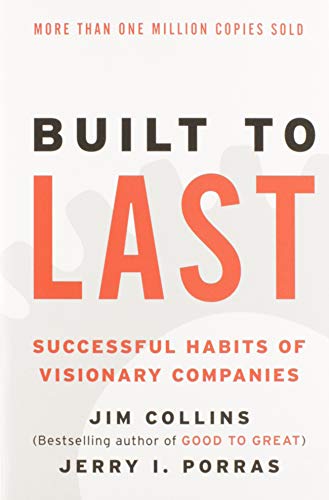Built to Last: Successful Habits of Visionary Companies (Good to Great, 2)
- Harper Business (2002年8月20日発売)
 本棚登録 : 53人
本棚登録 : 53人
 感想 : 4件
感想 : 4件
- Amazon.co.jp ・洋書 (342ページ)
- / ISBN・EAN: 9780060516406
感想・レビュー・書評
-
◆Author's note:
It is about buidling something that is worthy of lasting - about building a company of such a intrinsic excellence that the world would lose something important if that organization ceased to exist. A simple question - Why on earth would you settle for creating something mediocre that does little more than make money, when you can create something outstanding that makes a lasting contribution as well?
◆Continuity and Changes in the visionary companies:
Even the visionary companies need to continually remind themselves of the crucial distinction between core and noncore, between what should never change and what should be open for change, between what is truly sared and what s not.
◆Clock building, not Time telling:
Having a great idea or being a charismatic visionary leader is "time telling"; building a company that can prosper ar beyond the presence of any single leader and through multiple product life cycle is "clock building". The builders of visionary companies concentrate primarily on building an organization - building a ticking clock. Their greatest creation is the company itself and what it stands for. The company itself is the ultimate creation Be a "clock builder" - an architect - not a time teller.
◆No Tyranny of the "OR" (Embrace the "Genius" of the "AND"):
Instead of being oppressed by the "Tyranny of the OR", highly visionary companies liberate themselves with the "Genius of the AND" - the ability to embrace both extremes of a number of dimentions a the same time. Instead of choosing between A or B, they figure out a way to have both A and B. F. Scott Fitzgerald pointed out, "The test of a first-rate intelligence is the ability to hold two opposed ideas in the mind at the same time, and still retain the ability to funtion."
◆More than Profit:
Grand values and sense of purpose. Sony:
Purpose of incorporation
* To establish a place of work where engineers can feel the joy of technological innovation, be aware of their mission to society, and work to their heart's content.
* To pursue dynamic activities in technology and production for the reconstruction of Japan and the elevation of the nation's culture.
* To apply advanced technology to the life of the general public.
◆Managment guidelines:
* We shall eliminate any unfair profit-seeking, persistently emphasized substantial and essential work, and not merely pursue growth.
* We shall welcome technical difficulties and focus on highly sophisticated technical products that have great usefulness in society, regardless of the quantity involved.
* We shall place our main emphasis on ability, performance, and personal character so that each individual can show the best in ability and skill.
◆Sony Pioneer Spirit - traces Sony's root the very early days of the company
* Sony is a pioneer and never intends to follow others. Through progress, Sony wants to serve the whole world. It shall be always a seeker of the unknown... Sony has a principle of respecting and encouraging one's ability... and always tries to bring out the best in a person. This is the vital force of Sony.
◆Core ideology - exploding the profit myth:
Profitability is a necessary condition for existence and a means to more important ends, but it is not the end in itself for many of the visionary companies. Profit is like oxygen, food, water, and blood for the body; they are not the point of life, but without them, there is no life.
◆David Packard: "The profit is not the proper end and aim of management - it is what makes all of the proper ends and aims possible".
* I want to discuss why a company exisits in the first place. In other words, why are we here? I think many people assume, wrongly, that a company exisits simply to make money. While this is an important result of a company's exisitence, we have to go deeper and find the real reasons for our being. As we investigate this, we inevitably come to the conclusion that a group of peopleget together and exisit as an insititution that we call a company so they are able to accomplish something collectively tht they could not accomplish separately - they make a contribution to society, a phrase which sounds trite but is fundamental...
* You can look around and still see people who are interested in money and nothing else, but the underlying drives come largely from a desire to do something else - make a product - to give a service - generally to do something which is of value. So with that in mind, let us discuss why Hewlett-Packard Company exisits... The real reason for our exisitence is that we provide something which is unique that makes a contribution.
◆The critical issue is not whether a company has the "right" core ideology but rather it has a core ideology - likable or not - that gives guidance and inspiration to people inside that company. The very act of stating a core ideology influences behaviour towards consistency with that ideology. Secondly, and more important, the visionary companies don't merely declare an ideology; they also take steps to make the ideology pervasive throughout the organization and transcend any individual leader.
* The visionary companies more thoroughly indoctrinate imployees into a core ideology than the comparison companies, creating cultures so strong that they are almost cult-like around the ideology.
* The visionary companies more carefully nurture and select senior management based on fit with a core ideology than the comparison companies.
* The visionary companies attain more consistent alignment with a core ideology - in such aspects as goals, strategy, tactics, and organization design, than the comparison companies.
◆Jack Welch: "Numbers and values. We don't have the final answer here - at least I don't. People who make the numbers and share out values go onward and upward. People who miss the numbers and share our values get a second chance. People with no values and no numbers - easy call The problem is with those who makes the numbers but don't share the values... We try to persuade them; we wrestle with them; we agonize over these people."
◆Core Ideology = Core Values + Purposes:
Core values = The organization's essential and enduring tenets - a small set of general guiding principles; not to be confused with specific cultural or operating practices; not to be compromised for financial gain or short-term expediency.
Purpose = The organization's fundamental reasons for existence beyond just making money - a perpetual duiding star on the horizon; not to be confused with spefic goals or business strategies.
◆In a visionary company, the core values need no rational or external justification. Nor do they sway with the trends and fads of the day. Nor even do they shift in response to changing market conditions. The visionary leaders articulate what is inside them - what is in their gut, what is bone deep. It is as natural to them as breathing. It is not what they believe as much as how deeply they believed it (and how consistently their organization lived it). The key word is authenticity.
◆The primary role of purpose is to guide and inspire, not necessarily to differentiate. A visionary company continually pursues but never fully achieves or completes its purpose - like chasing the earth's horizon or pursuing a guiding star. Walt Disney captured the enduring, never-completed nature o purpose when he commented; "Disneyland will never be completed, as long as there is imagination left in the world".
◆Preserve the Core, Stimulate progress:
The central concept of this book; the underlying visionary dynamics of "Preserve the core and stimulate progress" that's the essence of a visonary company. The drive for progress is an internal force. A highly visionary company institutionalizes the specific individuals.
Intentions are all fine and good, but it is the translation of those intentions into concrete items - mechanism with teech - that can make teh difference between becoming a visionary company or forever remaining wannabe. The builders of visionary companies seek alignment in strategies, in tactics, in organization systems, in structure, in incentive systems, in building layout, in job design - in everything.
◆Seek consistent alignment:
1. Paint the whole picture - it's the remarkable comprehensiveness and consistency over time that counts.
2. Sweat teh small stuff - it's the little things that make a big impression, that send powerful signals.
3. Cluster, Don't shotgun - Search for synergy and linkages.
4. Swim in your own current, even if you swim against the tide - the real question to ask is "it this practice appropriate for us?"
5. Obliterte misalignment - if the strategy is misaligned with the core, change the strategy.
6. Keep the universal requirements while inventing new methods - keep all the key pieces working in alignment.
◆Building the Vision:
The fundamental distinguishing characteristic of the most enduring and successful corporations is that they preserve a cherished core ideology while simultaeously stimulating progress and change in everthing that is not part of their core ideology. They distinguish their timeless core values and enduring core purpose (which should never change) from their operating practices and business strategies (which should be changing constantly in response to a changing world). In truly great companies, change is a constant, but not the only constant.
◆The visionary framework:
A well-conceived vision consists of two major components - core ideology and an envisioned future. A good vision builds on the interplay between these two complementary yin-and-yand forces: it defines "what we stand for and why we exist" that does not change (the core ideology) and sets forth "what we aspire to become, to achieve, to create" that will require significant changes and progress to attain (the envisioned future).
◆To pursue the vision means to create organizational and strategic alignment to preserve the core ideology and stimulate progress towards the envisioned future. Alignment brings the vision to life, translating it from good intentions to concrete reality.
◆The key point is that the enduring great company decides for itself what values it holds to be core, largely independent of the current environment, competitive requirements, or management fads.
Who should be involved in articulating teh core values? The people who likely have a gut-level understanding of your core values, have the highest level of credibility with their peers, and the highest level of competence.
◆Core purpose - the organization's fundatmental reason for being - is more important than core values as the guiding and inspiring an organization. It is also more difficult to identify than core values. One powerful method for getting at purpose is the "Five Whys". "We make X products" or "We deliver X services" and then ask "why is that important". After a few whys, you'll find that you're getting down to the fundamental purpose of the organization.
◆A key role of core purpose is to guide and inspire. "Maximizing shareholder wealth" is the standard "off-the-shelf" purpose for those organizations that have not yet identified their true core purpose.
You do not "create" or "set" core ideology. You discover core ideology. It is not derived by looking to the external environment; you gt at it by looking inside. It has to be authentic.
The effect the core ideology has on people outside the organization is less important and shoud not be the determining factor in identifying the core ideology. Core ideology plays an essential role in determining who's inside and who's outside the organization. You cannot "install" new core values or purpose into people. Core values and purpose are not something people "buy in" to. People must aleady have a predisposition t holding them. Executives often ask, "How do we get people to share our core ideology?" You don't. You can't! Instead, the task is to find people who already have a predisposition to share your core values and purpose, attract and retain these people, adn let those who aren't disposed to share your core values go elsewhere.
詳細をみるコメント0件をすべて表示
JimCollinsの作品
































